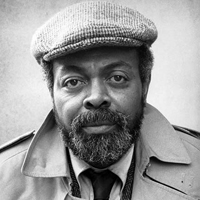The New World by Amiri Baraka: Summary
This beginning of the poem suggests that its setting is one of an evening. The speaker can see the cars stopped beyond the window. He seems to be an inhabitant of the place, an outsider who looks at things with a detachment and a critical attitude.

Amiri Baraka (1934-2014)
So he says that those who realize… stare solemnly... He goes on to comment on the people now: he says that they are liars, and 'seekers after ridiculous righteousness. His 'doubles', which means the other poets and artists, and his friends, are also no better. Only that their mistakes 'cannot be duplicated by machines'.
The speaker then goes on to describe the plight of the people, and that perhaps includes poets and artists like himself, He says that they are broke or broken, and are 'dribbling at the eyes'. He sees many compeers who are no better than the lying, pretending, hypocritical common lot. Even the artists are all the same sort of people living in dreams and illusions, and without any personal or social values. They have all seen their dreams come true, but only to see them shattered (see them turn out to be 'horrible conceits and plastic fantasies') the very next moment. These words remind us of the Beat generation and Ginsberg's poetry of spiritual enlightenment and crisis; Baraka was one of the Beat poets in the fifties but discarded it in favor of more social and racial concerns in the seventies. The succeeding lines of this poem have many allusions to the literary movements of the time. But before that the persona criticizes the scenario of literature and art, he goes on to criticize the false social behavior of the Americans.
The 'horrible conceits and plastic fantasies' that belie the artist's dreams (that Baraka himself faced and therefore discarded) are also a part of the general cultural “gesture and extension”. He finds that the people and probably the artists as well are “distributing misinformation” especially about the “nature of understanding". It means that the people are experiencing one thing and telling the others something else. This Baraka implies, is the nature and curse of the American (western) civilization.
The persona does understand that to be so critical of the whole civilization is to take risk; he is not feeling very good to be an iconoclast. He knows that "No one is that simple/ or priggish, to be alone out of spite and grown strong/ in its practice..." But the fact remains that there are many things not right about this culture and civilization. Then the persona gives many suggestions about the literary and art movements of the sixties: he suggests that there is nothing constant and reliable about the American society. Our style, / and discipline controlling the method of knowledge, / Beatniks, like the Bohemians, go calmly out of style." The phrase “method of knowledge” also encompasses the broader idea of philosophy and larger socio-cultural values. All those things are changing like ephemeral fashions of clothes and slang in America. The phrase "Boys are dying in Mexico" seems, to hint at the young poets of the late sixties. This may also be an allusion to the ‘hipsters' of the seventies also. This belated new generation was broke and broken in every way: they were immersed in the problems of drug addiction, alcoholism, depression, nervous breakdown, and so on. The expression “mark their holes with filthy needles” indicates their use of drugs.
Before making a conclusion, the poet brings up the issue of 'lust', another concern related to the burning problems (homosexuality, misuse and devaluation of sex) of the American culture. But the problem is raised without much explicit statement of the poet's 'evaluation'. The tone is that of a serious and thought-provoking mention of the issue in such a way as if the reader will understand it all just from a mention of it: "The lust of the world". Then he also adds: "This will not be news", in another short sentence, followed by a comment, "The simple damning lust". The word 'damning' suggests the speaker's belief that 'lust' is damning.
With a stanza break that also breaks the line, the poet changes the subject of the poem. In a much more soul-searching mood, he tells (in a manner of swearing) us to empty all of him "for knowing"... Then with another abrupt change of idea within the line itself, he asks a question: "and will the danger/ of identification// Let me sit and go blind in my dreaming/ and be that dream in purpose and device./ A fantasy of defeat..." The ending of the poem has two important thematic features concealed beneath the apparently simple meditation. One is Baraka's concern for the 'nature of identity in the modern world: how can one be a non-conformist and still be known as someone? And the other is the personal concern related to the general concern of human condition and the corrupted nature of the present civilization. This personal note in the poem is apparent in the last lines: "a strong man/ older, but no wiser than the defect of love.”
Cite this Page!
Sharma, Kedar N. "The New World by Amiri Baraka: Summary" BachelorandMaster, 22 Sep. 2014, bachelorandmaster.com/britishandamericanpoetry/the-new-world-summary.html.
Related Topics
The New World: Critical Analysis
In Memory of Radio: Summary and Analysis
 |
bachelorandmaster.com |